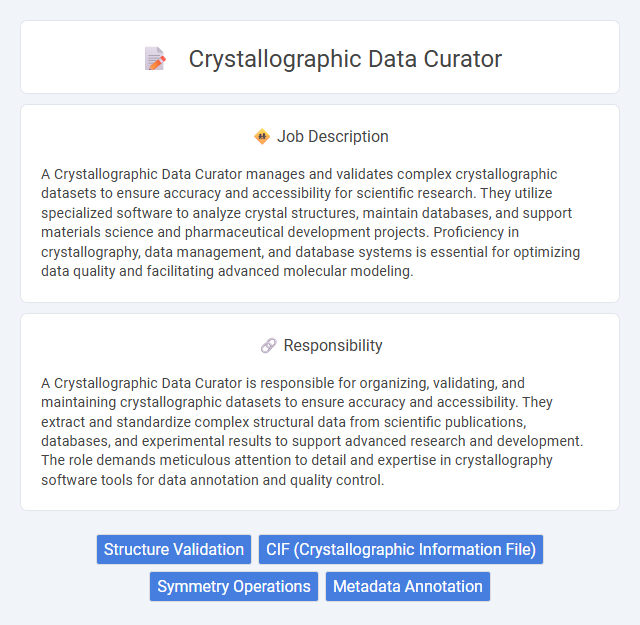
A Crystallographic Data Curator manages and validates complex crystallographic datasets to ensure accuracy and accessibility for scientific research. They utilize specialized software to analyze crystal structures, maintain databases, and support materials science and pharmaceutical development projects. Proficiency in crystallography, data management, and database systems is essential for optimizing data quality and facilitating advanced molecular modeling.
Individuals with strong attention to detail and a passion for data accuracy are likely to thrive as Crystallographic Data Curators. Those who enjoy working systematically with complex datasets and have a background in crystallography or materials science may find this role particularly suitable. Conversely, people who prefer dynamic, fast-paced environments or lack patience for meticulous data validation might find this position challenging.
Qualification
A Crystallographic Data Curator should possess advanced knowledge in crystallography, materials science, or chemistry, typically supported by a degree in one of these fields. Proficiency in data management software, crystallographic databases such as the Cambridge Structural Database (CSD), and experience with XML and CIF (Crystallographic Information File) formats are essential. Strong analytical skills, attention to detail, and familiarity with standard data validation protocols ensure high-quality and accurate dataset curation for scientific research.
Responsibility
A Crystallographic Data Curator is responsible for organizing, validating, and maintaining crystallographic datasets to ensure accuracy and accessibility. They extract and standardize complex structural data from scientific publications, databases, and experimental results to support advanced research and development. The role demands meticulous attention to detail and expertise in crystallography software tools for data annotation and quality control.
Benefit
Working as a Crystallographic Data Curator likely offers the benefit of contributing to the integrity and accessibility of vital scientific data, enhancing research outcomes across multiple disciplines. This role probably provides opportunities to develop specialized expertise in data management and crystallography, which can increase professional value in niche scientific communities. Exposure to cutting-edge software and collaboration with researchers might also improve problem-solving skills and open pathways to advanced career positions.
Challenge
The Crystallographic Data Curator role likely involves the challenge of ensuring the accuracy and consistency of complex structural datasets, which may require advanced expertise in crystallography and data management. Managing large volumes of intricate data might demand proficiency in specialized software and the ability to identify errors or anomalies that could impact research outcomes. This position probably requires balancing meticulous attention to detail with efficient handling of evolving scientific standards and technologies.
Career Advancement
Crystallographic Data Curators manage and validate complex structural datasets essential for materials science and pharmaceutical research, enhancing data accessibility and integrity. Proficiency in crystallography software and data standards opens pathways to senior data scientist or research analyst roles within academia or industry. Mastery in data curation accelerates career advancement by positioning professionals at the intersection of computational chemistry and informatics innovation.
Key Terms
Structure Validation
Crystallographic Data Curators specializing in Structure Validation meticulously analyze and verify the accuracy of crystal structures using advanced software tools and databases such as the Cambridge Structural Database (CSD). Their role involves detecting inconsistencies in atomic coordinates, bond lengths, and angles to ensure the integrity and reliability of crystallographic datasets. Expertise in interpreting X-ray diffraction patterns and applying validation algorithms is essential to maintain high-quality data for research and publication purposes.
CIF (Crystallographic Information File)
A Crystallographic Data Curator specializes in managing and validating Crystallographic Information Files (CIF), ensuring the accuracy and completeness of structural data used in materials science and chemistry research. Proficiency in parsing CIF syntax and metadata standards is essential for maintaining database integrity and facilitating data sharing among crystallography communities. Expertise in software tools such as CCDC's Mercury and validation protocols for CIF files enhances data interoperability and supports reproducible scientific outcomes.
Symmetry Operations
A Crystallographic Data Curator specializing in symmetry operations manages and validates the precise application of symmetry elements such as rotation axes, mirror planes, and inversion centers in crystal structures. This role ensures accurate representation and categorization of space groups, essential for reliable crystallographic databases and subsequent materials research. Expertise in symmetry operations supports the integrity of structural data critical for advanced computational modeling and experimental reproducibility.
Metadata Annotation
Metadata annotation in a Crystallographic Data Curator role involves accurately tagging crystallographic datasets with standardized descriptors to enhance data discoverability and interoperability. This task requires expertise in crystallography, familiarity with metadata standards such as CIF (Crystallographic Information Framework), and proficiency in data management tools to ensure consistency and quality in annotations. Proper metadata annotation facilitates efficient data retrieval, supports advanced research analyses, and promotes data sharing within the scientific community.
 kuljobs.com
kuljobs.com